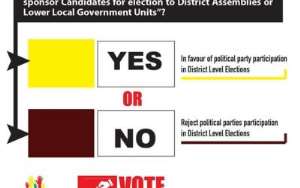
The Director for the Institute of Local Government Studies, Dr. Nicholas Awortwi is urging Ghanaians to vote 'Yes' in the upcoming December 17 referendum.
Dr Nicholas made this appeal when he was speaking to the people of the Kpone Katamanso Traditional area on the topic: "Referendum and District Elections" organised by the Kpone Katamanso District Assembly.
According to him, Ghanaians have a lot to gain by voting 'Yes' in the upcoming referendum because it has a lot of benefits to offer.
He argued that voting 'Yes' will provide a learning platform for the next generation of leaders in the country.
Dr. Nicholas noted that the opportunity to contest for the various assembly positions across the country will groom strong and capable leaders who will learn the art of competition and responsibility as opposed to earlier practices which give no room for such important ingredients of the leadership process.
He also argued that it will give candidates the opportunity to compete based on ideas and not an appointment basis.
According to him, candidates will be able to creatively innovate genuine ideas that can be used to change the fortunes of their communities, something which is currently missing in the local governance system.
"Thus, if Ghanaians agree that local assembly representatives should be elected and political parties can engage in the process, it will ultimately mean that assembly members will be selected based on the ideas they are able to sell to the community."
This, according to him, will lead to accountability, as elected assembly representatives will be more accountable to the people, more so because they will have to go back to the electorate to renew their mandate after every 4years.
Dr Awortwi also noted that, since assembly members will be elected, they will have much more focus on delivering their promises, bringing development to the people and working better to change their communities since they will be elected or rejected in the future based on their performance.
Speaking on the issue of political parties involvement in the local level elections, Dr Awortwi opined that political party involvement at the local level was already a practice. "Voting Yes in the referendum will only make public what is already being practiced."
This, according to him, will even afford the smaller parties the opportunity to concentrate their energies on local government elections and have the opportunity to advance their brilliant development strategies at the local level.
"This will ultimately lead to grass-root mobilisation and participation," Dr Awortwi reiterated.
Background
Whiles the mainstay of the referendum is to decide whether article 55(3) of the 1992 constitution of Ghana should be amended to allow the active participation of political parties in district level elections through the sponsorship of candidates, things have been made to look like it is article 243(1) that the electorates are going to vote on.
Article 243(1) of the constitution states that: There shall be a District Chief Executive for every district who shall be appointed by the President with the prior approval of not less than two-thirds majority of members of the Assembly present and voting at the meeting.
A 'YES' or a 'NO' is a decision on whether political parties should be given the right to pick candidates and promote them to be elected as DCEs, Assemblymen or Unit Committee Members and not to decide on whether who gets into the office of a DCE, Assemblymen or Unit Committee Member should be elected by the general Ghanaian electorate.
The prerequisite for the adoption of the new proposal is that at least 40% of registered Ghanaian voters turnout to vote during the referendum, out of which 75% or more must vote YES.





 Tuesday’s downpour destroys ceiling of Circuit Court '8' in Accra
Tuesday’s downpour destroys ceiling of Circuit Court '8' in Accra
 SOEs shouldn't compromise on ethical standards, accountability – Akufo-Addo
SOEs shouldn't compromise on ethical standards, accountability – Akufo-Addo
 Father of 2-year-old boy attacked by dog appeals for financial support
Father of 2-year-old boy attacked by dog appeals for financial support
 Jubilee House National Security Operative allegedly swindles businessman over sa...
Jubilee House National Security Operative allegedly swindles businessman over sa...
 Nobody can order dumsor timetable except Energy Minister – Osafo-Maafo
Nobody can order dumsor timetable except Energy Minister – Osafo-Maafo
 Mahama wishes National Chief Imam as he clock 105 years today
Mahama wishes National Chief Imam as he clock 105 years today
 J.B.Danquah Adu’s murder trial: Case adjourned to April 29
J.B.Danquah Adu’s murder trial: Case adjourned to April 29
 High Court issues arrest warrant for former MASLOC Boss
High Court issues arrest warrant for former MASLOC Boss
 Align academic curriculum with industry needs — Stanbic Bank Ghana CEO advocates
Align academic curriculum with industry needs — Stanbic Bank Ghana CEO advocates
 Election 2024: We'll declare the results and let Ghanaians know we've won - Manh...
Election 2024: We'll declare the results and let Ghanaians know we've won - Manh...
